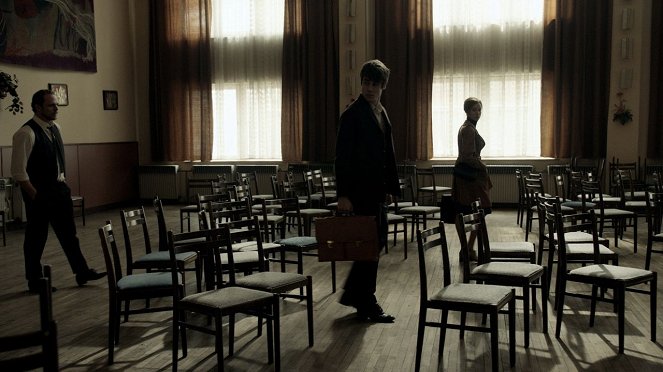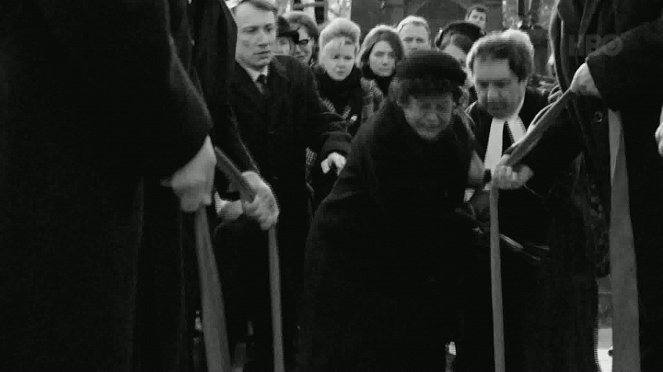Réalisation:
Agnieszka HollandScénario:
Štěpán HulíkActeurs·trices:
Táňa Pauhofová, Jaroslava Pokorná, Petr Stach, Igor Bareš, Vojtěch Kotek, Adrian Jastraban, Patrik Děrgel, Ivan Trojan, Jenovéfa Boková (plus)Résumés(1)
Full of star actors, the drama Burning Bush is based on real events and real characters. Its main character is lawyer Dagmar Burešová (Tatiana Pauhofová), who decided to defend Jan Palach’s mother Libuše (Jaroslava Pokorná) and her brother Jiří (Petr Stach) in a seemingly hopeless court case. The cause of the libel suit filed by the family of the dead student was the scandalous accusation by Communist MP Vilém Nový (Martin Huba), who spoke out at a Communist party meeting in Česká Lípa and downplayed Palach’s sacrifice with some nonsense about “cold fire”. The husband of the courageous lawyer – both of them are forced to cope with the pressure of pro-Soviet collaborators – is played by Jan Budař. (HBO Europe)
(plus)Vidéo (3)
Critiques (10)
Jan Hřebejk avait sans doute raison lors des Récompenses des critiques de films tchèques : ce téléfilm n’a rien à envier à un long métrage destiné au cinéma. Agnieszka Holland a montré qu’elle jouait dans la cour des grands en filmant une minisérie compacte avec une histoire prenante, une photographie magnifique et d’excellentes prestations d’acteurs. La flopée de stars est dominée (et de loin) par Jaroslava Pokorná, dont les scènes font parfois mal au cœur. Táňa Pauhofová se donne comme jamais auparavant, David Novotný et Igor Bareš dans les rôles antagonistes ne sont pas en reste (comme à leur habitude), Vojtěch Kotek surprend et Ivan Trojan est une valeur sûre. Le seul choix qui m’a laissé perplexe, c’est celui de Martin Huba ; je trouve que le rôle de député communiste ne convenait pas à cet acteur sympathique, gentil et raffiné.
()
Une épitaphe au passé sombre de la nation tchécoslovaque. Un passé qui a enlevé aux gens le sourire des lèvres, mais dans lequel trente pour cent souhaitent retourner. Et qui doit être confié à une réalisatrice étrangère pour pouvoir être retranscrit de façon digne. Agnieszka confirme son statut de brillante dramaturge et le film laisse clairement percevoir qu'elle est elle-même touchée par la matière. Soigneusement écrit, joué avec conviction et, pour une production télévisuelle, visuellement attrayant, digne du grand écran. C’est le premier tiers – le plus humain – qui m'a le plus séduit.
()
Burning Bush is primarily an extremely instructive miniseries, which may not be detrimental in the case of a family melodrama but, in my opinion, it’s not right to consistently lead the viewer in a political drama. I don’t know the reason why a non-melodramatic story would be told with such intensified expressiveness. As if the events after Palach’s self-immolation didn’t have sufficient dramatic potential in and of themselves, drama is created artificially and, on top of that, it is magnified by almost exploitative means. Overacting, tense musical accompaniment, amplified sounds (ideally the screaming of children). The series’ creators underestimate the forcefulness of something as simple as silence. In the second episode, the series slips into horror a few times and, in the third the intense attempt to make the content more attractive culminates in a passionate erotic scene. The bloated drama makes it difficult to distinguish banal events from truly important situations. Everything is taken to the extreme. Always. There is no way to build further tension. ___ The screenplay also suffers from misplaced emphasis, as it focuses on details where they serve no purpose and follows more plot lines than can be satisfactorily developed and taken anywhere in the space of four and a half hours. Carefully studied by Hulík, the historical context here explicitly fights for attention with the personal lives of the protagonists, which ultimately win out (and, for example, the pressure exerted on the Czechoslovak government by Moscow, which feared a shitshow comparable to the events of August 1968 and considered the post-Palach demonstrations to be a manifestation of unstable party leadership, is left out entirely). On the one hand, the series resorts to the use of cheap shortcuts in the depiction of some of the supporting characters (basically everyone except for Burešová) and, at the same time, suffers from an excess of words that either don’t find a more solid place in the overall narrative or are completely unnecessary. An actor’s appropriately chosen look would often have sufficed to express the same thing. Furthermore, the characters speak as if they were in court (i.e. properly and diplomatically), even though they’re not in court. If Holland didn’t want to radically intervene in the screenplay out of a sense of tactfulness, the dramaturg should have taken care of any additional pruning of the script. ___ If the first episode with its all-encompassing greyness and ruination of the oncoming period of normalisation cannot be believed because of its generally overwrought nature, the calmer second episode, with its much more tightly focused narrative, conveys the funereal post-August mood significantly more convincingly, although it works with the highly improbable supposition that there was a sudden turning point after the invasion by Warsaw Pact troops. Almost no one is interested in public events, almost everyone is angry, the level of services is dismal and the food in restaurants is inedible. The streets are teeming with StB agents and cops who never squander an opportunity to harass innocent citizens. Is the depiction of Czechoslovakia as a place that was absolutely unsuitable for normal life really the best way to come to terms with normalisation? The clearly categorised characters are demonstrative of the attempt to promote existing myths rather than call them into question, let alone demolish them. The dehumanisation of the communists, who also have families to feed, comes across as forced. In his film Barbara, Christian Petzold was incomparably more convincing in creating a normalisation-era moral labyrinth in which almost anyone lose themselves. With its natural, clearly conveyed course of events, Barbara is in a number of respects the exact opposite of Burning Bush. ___ The ruin is amplified by the highly professional craftsmanship. The shots are thrown into dark colours, the setting is often a smoky room, the camera captures (or follows) the characters from a distance, often through other objects, with numerous reflective surfaces in the foreground (windows, doors, display cases). Unlike the soundtrack, the documentary-style “inquisitive” (in fact, very carefully thought out) filming does not aggressively push us to adopt a single point of view, but the music and words win out over the images just like the personal dramas triumph over dry factography. Whether intentionally or incidentally, Holland formalistically follows on from the best of the Polish school of moral disquiet, though unfortunately only formalistically and unfortunately only sometimes (mainly in the second episode, which, unlike the other two, deals more with facts than emotions). ___ The non-artistic value of Burning Bush clearly outweighs its actual qualities and its creators undoubtedly have a great advantage in the fact that nothing (more significant) has been made on the given subject yet. It will be up to other filmmakers to try again, differently, and hopefully better. 65%
()
(moins)
(plus)
Here the Lord's messenger appeared to him in a blazing fire from the middle of a thorn bush. Moses saw that the bush was on fire but was not consumed. [Exodus, 3.2] The masterful dramatization of events, the echoes of which still haunt us today. Štěpán Hulík chose the most difficult path, examining Palach's act from several angles. He seamlessly transitions from personal testimony to a conspiracy thriller and then to a legal drama, with each having its firmly anchored place in the plot. The way director Agnieszka Holland observes the whole situation is admirable because instead of serving a cheap epitaph of an extreme act, she offers an analytical probe into the era, which primarily calls the nation's conscience into question, a nation known for its very short memory. A multitude of excellent actors (I personally salute Jaroslava Pokorná), a multimillion-dollar budget squeezed to the last drop, and a cinematic event that reminds us that not all films are meant only to entertain us. I can't remember the last time something resonated so strongly within me.
()
Burning Bush is an absolutely perfect work of art and I would love to express my gratitude to the Polish director Mrs. Holland. I would also like to thank HBO for being bold enough to pour so much money into such an important premise, to have the Palach story made into a movie. My thanks also go out to the actors, who showed everybody what good actors they are, and the screenwriter for writing such a good and well-rounded story about Jan Palach. I really have no words to say. Burning Bush is such a demanding and depressing story that all the time it was being told on my screen, I had an unpleasant feeling, I felt sick and sad. I really felt something I seldom feel when watching a movie. It wasn’t only because this movie is about the history of my country, but mainly because it is absolutely amazing cinematography, which shouldn’t be overlooked under any circumstances. The best thing about it is the way they work with emotions – they got my nerves going as well as the nerves of the actors who were working on the movie. The initial outburst of an effort to change things was all of the sudden replaced with fear and hopelessness. This heavy blanket fell on an entire generation until in 1989 the new generation had their voices heard, who were not affected by the 1960’s, and who did away with the communist swine once and for all. By the way, don’t try to tell me that today’s communists are different people. If they were completely different people, they couldn’t be wiping their asses with Palach’s legacy on the anniversary of his death, saying he was a leftist. If there is anybody who should rot in hell, it’s Grebeníček, Filip and all them commie sons-of-bitches, who keep using a sickle and hammer as a logo for their leftist party. My only hope is that people won’t be so stupid again and that they won’t get riled up with political speeches. It was enough they failed at the presidential election, which took a bit of my hope again. Nevertheless, as they say, hope dies last, and the plot of Burning Bush sticks to this credo. And the plot won’t let me sleep for as long as I live.
()
Photos (92)
Photo © Home Box Office (HBO) / Dušan Martinček, Kamil Rodinger



Annonces